

Philippines may seek clemency anew for drug convict in Indonesia. Human rights. Koenders condemns execution of Dutch national in Indonesia. News item | 17-01-2015 ‘The Netherlands condemns the execution of Mr Ang in Indonesia.
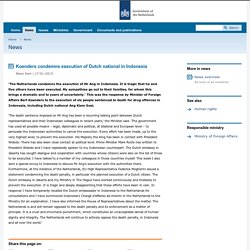
It is tragic that he and five others have been executed. My sympathies go out to their families, for whom this brings a dramatic end to years of uncertainty.’ This was the response by Minister of Foreign Affairs Bert Koenders to the execution of six people sentenced to death for drug offences in Indonesia, including Dutch national Ang Kiem Soei. Indonesien: Nach Mitternacht sollen neun Menschen hingerichtet werden. Indonesien hat die strengsten Drogengesetze weltweit.

Neun wegen Drogenhandels zum Tode verurteilte Gefangene sollen heute erschossen werden. Nur ein Mensch könnte die Hinrichtungen noch stoppen. "Die Exekution der neun Verurteilten wird nach Mitternacht stattfinden", erklärte Generalstaatsanwaltschaft Muhammad Praseyto. Indonesien zählt zu den Ländern mit den strengsten Drogengesetzen weltweit.
"Ich werde ihn nicht wiedersehen", sagte die Mutter des Australiers Myuran Sukumaran Reportern schluchzend. Australiens Außenministerin Julie Bishop kündigte Konsequenzen an, wenn die Urteile vollstreckt werden. Die Staatsanwaltschaft weigerte sich zunächst, den genauen Hinrichtungstermin zu nennen, um Medienrummel zu vermeiden. Neben UN-Generalsekretär Ban Ki Moon hat sich auch der Beauftragte der Bundesregierung für Menschenrechtspolitik und humanitäre Hilfe, Christoph Strässer, für die Verurteilten eingesetzt. People can change – if you let them live. On the back of Myuran Sukumaran’s portrait of Indonesian President Widodo the artist has scrawled a short note.
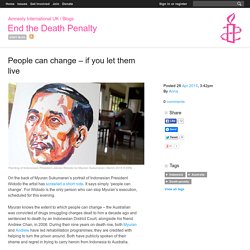
It says simply ‘people can change’. For Widodo is the only person who can stop Myuran’s execution, scheduled for this evening. Myuran knows the extent to which people can change – the Australian was convicted of drugs smuggling charges dealt to him a decade ago and sentenced to death by an Indonesian District Court, alongside his friend Andrew Chan, in 2006. Twitter. Japanese war apologies lost in translation. Author: Tessa Morris-Suzuki, ANU 15 August 2015 marks the 70th anniversary of the end of the Pacific War.
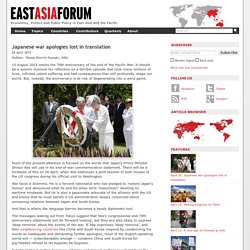
It should be a solemn moment for reflection on a terrible episode that took many millions of lives, inflicted untold suffering and had consequences that still profoundly shape our world. But, instead, the anniversary is at risk of degenerating into a word game. Much of the present attention is focused on the words that Japan’s Prime Minister Shinzo Abe will use in his end-of-war commemorative statement. There will be a foretaste of this on 29 April, when Abe addresses a joint session of both houses of the US congress during his official visit to Washington. Abe faces a dilemma. And that is where the language barrier becomes a handy diplomatic tool. The messages leaking out from Tokyo suggest that Abe’s congressional and 70th anniversary statements will be ‘forward looking’, but they are also likely to express ‘deep remorse’ about the events of the war. Bali Nine: Andrew Chan and Myuran Sukumaran's bid for second judicial review of death sentences rejected.
Updated An Indonesian court has denied Australian drug smugglers Andrew Chan and Myuran Sukumaran the chance to have another judicial review of their death sentences, meaning there is now nothing stopping their executions.

In a final attempt to save themselves from the firing squad, lawyers for the two men lodged applications with the Denpasar district court for a second judicial review. They had recently been denied presidential pardons which was considered the last avenue of appeal, but attempted to have the courts reopen the case.
At a press conference in Bali, court spokesman Hasoloan Sianturi announced that the application had been denied. "From the administrative [file] of the judicial review, according to the reasonings given it has not meet the requirements for the judicial review since no new evidence is provided by the convicts," he said. Bali Nine: Andrew Chan, Myuran Sukumaran to be executed together. Cindy Wockner speaks exclusively to the mother and family of death row inmate Myuran Sukumaran about the rejection of his clemency plea by the Indonesian President.
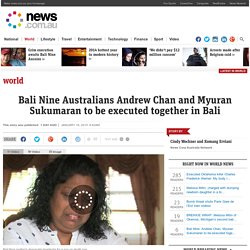
Produced by Josh Wall News More videos available at the News video hub. Six drug convicts to be executed on Jan. 18: AGO. The Attorney General’s Office (AGO) will execute six drug convicts this Sunday in Nusa Kambangan and Boyolali, both in Central Java.
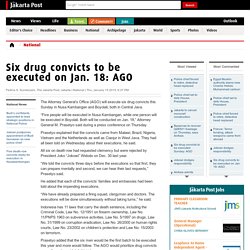
“Five people will be executed in Nusa Kambangan, while one person will be executed in Boyolali. Both will be conducted on Jan. 18,” Attorney General M. Prasetyo said during a press conference on Thursday. Prasetyo explained that the convicts came from Malawi, Brazil, Nigeria, Vietnam and the Netherlands as well as Cianjur in West Java. They had all been told on Wednesday about their executions, he said. All six on death row had requested clemency but were rejected by President Joko “Jokowi” Widodo on Dec. 30 last year. “We told the convicts three days before the executions so that first, they can prepare mentally and second, we can hear their last requests,” Prasetyo said. He added that each of the convicts’ families and embassies had been told about the impending executions.
“We have already prepared a firing squad, clergymen and doctors. Indonesia to carry out executions this year after hiatus. World | Agence France-Presse | Updated: February 02, 2013 16:36 IST Jakarta: Indonesia is set to execute some convicts on death row for murder and drugs offences in 2013 after not carrying out an execution for several years, a senior official said Saturday.

There are 17 convicts, among them foreigners, who "can be executed starting from this year as they have exhausted all legal avenues for appeal," Mahfud Mannan, the deputy attorney general for criminal cases, told AFP. He did not reveal their identities or say when executions might take place. Bali: un Français risque la peine de mort pour trafic de drogue. Bali: un Français risque la peine de mort pour trafic de drogue (AFP) – 2 mai 2013 DENPASAR (Indonésie) — Le procès d'un Français qui risque la peine de mort après avoir été interpellé transportant dans son estomac quatre capsules de haschich s'est ouvert jeudi sur l'île indonésienne de Bali.

Vincent Roger Petrone, né à Dijon le 31 mai 1969 et domicilié à Nouméa en Nouvelle-Calédonie, est accusé d'avoir importé illégalement 69 grammes de stupéfiants, d'une valeur marchande d'environ 42 millions de roupies (3.200 euros), selon la police. Le trafic de plus de cinq grammes est passible de mort en Indonésie. Les juges n'ont cependant pas pour habitude d'infliger la peine capitale pour des quantités aussi limitées. Au premier jour du procès au tribunal de Denpasar, à Bali, les douaniers ont expliqué comment le Français avait attiré leur attention par son comportement étrange à son arrivée à l'aéroport international de Bali, le 29 janvier.
"Son attitude était très suspecte. Copyright © 2013 AFP. Lowy Institute for International Policy - Pale Moon.